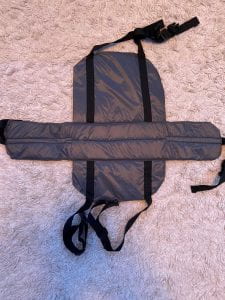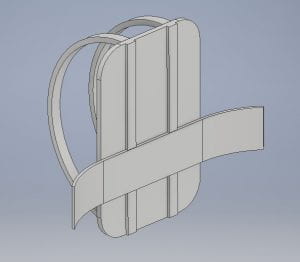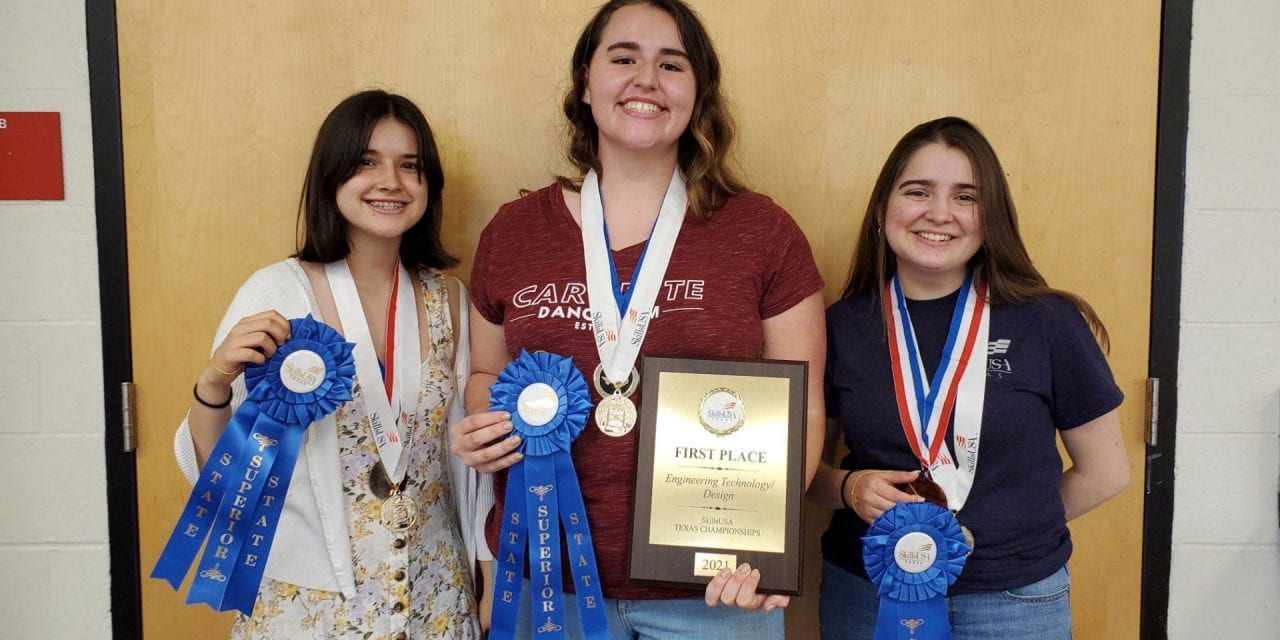School is out, and students have jumped into summer break. But a trio of MacArthur High School engineering students aren’t quite finished with their extracurricular activities. Recent graduates Macie McKee and Serra Marquez, along with incoming sophomore Grace Marquez, won state and landed a bid to the SkillsUSA national competition with their engineered solution, Backpack Penguin – an attachment that helps redistribute the weight of heavy backpacks.
 “Kids in AP classes or higher level classes have to carry around a lot of textbooks or binders – at least this was before COVID, before everything turned virtual,” says Serra. “After COVID, even having a laptop that you carry around with you can add a lot of weight to your backpack. In engineering class we’re always told to think about the problems in your life that you have and that people you are around have and to focus on finding solutions for those. You can go broader from there, but it’s a good starting point. That’s how the idea came about – from our own personal experiences.”
“Kids in AP classes or higher level classes have to carry around a lot of textbooks or binders – at least this was before COVID, before everything turned virtual,” says Serra. “After COVID, even having a laptop that you carry around with you can add a lot of weight to your backpack. In engineering class we’re always told to think about the problems in your life that you have and that people you are around have and to focus on finding solutions for those. You can go broader from there, but it’s a good starting point. That’s how the idea came about – from our own personal experiences.”
Although there are solutions for heavy loads for hiking and backpacking, they are impractical in terms of walking around school hallways. Other solutions require the purchase of an entirely new backpack. “We wanted a device that could be attached to any backpack,” says Macie.
Enter the Backpack Penguin, a contraption can be affixed to any backpack to redistribute weight across an individual’s back, taking the pain off the shoulders. The team engineered miniature prototypes with materials such as cardboard, tin foil and craft foam before settling on a durable but lightweight nylon kite fabric wrapped around yoga mat pieces fastened with straps and buckles.
“It won’t rip but it’s lightweight and it’s not adding extra weight to the problem,” says Macie.
“We’d joke, ‘if it’s Macie-proof, we’re good to go,’” adds Serra. “We always tell her that she has all the horsepower. She’s really strong so she’s really good with the physical aspect – sewing the product together and testing how strong the materials we used were. She would be the one to try to pull it apart.”
 Macie also took lead on the prototype assembly while Serra was the appointed documentation person who kept the project notebook. After Aishi graduated, Grace lent a hand with computer-aided design and prepared the tri-fold for presentation.
Macie also took lead on the prototype assembly while Serra was the appointed documentation person who kept the project notebook. After Aishi graduated, Grace lent a hand with computer-aided design and prepared the tri-fold for presentation.
For two of the three members, this isn’t the first taste of national competition. In 2019, then-sophomores Macie and Serra, along with 2020 MacArthur graduate Aishi Guha, won state and placed third (out of about 35 teams) at nationals. After winning district last year, the same trio appeared on track to make another decorated run through competition. Then the pandemic hit, canceling the state and national contests.
After Aishi graduated, the team needed a third teammate to round out their squad. They didn’t have to look very far, recruiting Serra’s younger sister.
“Grace kept telling me that she wanted to do what I did,” Serra says. “We needed someone that was in an ACE (architecture, construction and civil engineering) class or had a STEM endorsement. She was already in construction, so it was a great fit. I knew that she would do the best that she could. I wasn’t worried about that at all. She’s hardworking – I’ve seen that firsthand as her sister.”
Given the shortened season, teams were able to use projects from last year this year. Macie, Serra and Grace took the 2020 district championship-winning project and made a few improvements. Unlike previous years where teams presented their projects, this year’s district competition – which was virtual – was a written technical test. The top two-scoring teams advanced to state.
In a typical year, competitors present their product with a tri-fold. But because everything was virtual, the team had to pivot and adjust.
“Whenever you’re showing something that you made and how it works, it’s a lot harder to do on Zoom,” says Macie. “There were some technical difficulties, but they were pretty understanding that it was challenging to present virtually.”
The technical difficulties must have been minimal as the trio from MacArthur secured a second state championship and bid to nationals. The top-level competition will also be held virtually June 21-24.
“It’s a nice end to senior year,” says Serra. “Even though we graduated, it’s icing on the cake because we have one final thing we get to do together before Macie and I go to college and both pursue our own types of engineering.”
Macie plans to study biomedical engineering at the University of Texas at Austin while Serra plans to pursue a degree in civil engineering at the University of Notre Dame. Grace, the younger Marquez, will be a sophomore at MacArthur High School.
“It’s nice for Grace, too, because it’s her way of ending it with us and going forward into the rest of her high school experience,” says Serra. “The first time we made it to nationals, we thought it was a fluke. We thought, ‘we’re just going to do it, have fun and learn from the experience.’ Now that we know what the competition entailed, we thought, ‘we can do it again if we really want to, it’s just a matter of putting in the work.’ It’s crazy to be going to nationals again. It’s incredible, really.”





